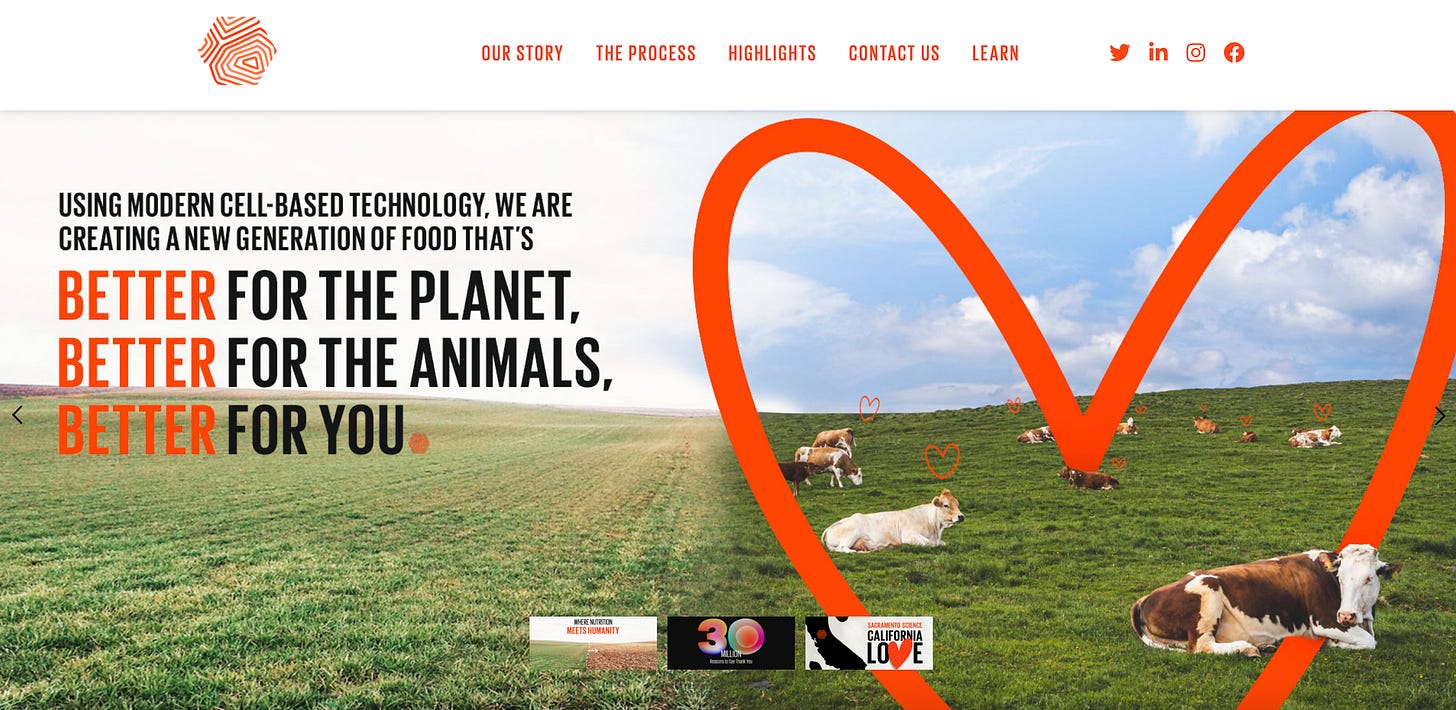Are you the Children of a New World?
Welcome to "nouveau monde", your "nouveau genre" (see, we even create new words) newsletter to better understand how to make the world better through the lens of retail. This is #39
Le menu du jour at nouveau monde is about some pieces about agriculture in the 21st Century.
Things move fast in retail and sustainability, we’re really happy to help you get the right tips and be inspired!
Read, like, share, subscribe :-)
Today's newsletter is 1,060 words, a 5.3-minutes read. At first :)
A fake “moo” that sounds sustainable
by Phil
Some guys want to make omelette without eggs, others want to make meat with is no meat, or meat that comes from cells. Fake fish, or fish from cells. And so on. Crazy times for an old guy like me, selling eggs at a farmers market when I was 16.
Wait, it’s just the beginning. Welcome to the bio-era.
Solar Biotech “use proprietary SynBio Hyperintegration Algorithms (SHAs), which deliver customized, for each SynBio product, modular plant architectures, called BioNodes, with unique performance at scale and low operating costs.”
Synbio, you said?! Ah, you mean synthetic biology, this “multidisciplinary area of research that seeks to create new biological parts, devices, and systems, or to redesign systems that are already found in nature”. Thank you Google.
What?! No, they don’t play with molecules. It’s just algorithms. It’s safe, Laurence Olivier would say.
Solar Biotech is a sort of supplier for company like TurtleTree Labs to help them develop their product and move towards higher capacity production, because they know how to “make customized plant architectures to help future food and other companies scale up their bio-manufacturing capacity”.
TurtleTree creates highly functional components naturally found in milk, including lactoferrin, human oligosaccharides (HMOs), and alpha-lactalbumin. In short, TurtleTree Labs creates the technology to produce milk sustainably using their proprietary cell-based methods, cell-based dairy if you want. The Singaporean startup raised $30 millions to develop the US market. Lactalis, Danone, Sodiaal, be aware (if you haven’t started to investigate this area already…).
As you can imagine, investors, and VCs specifically are very interested investigating new production processes and hopefully profits. It does not matter if it works, it’s like betting on a casino, that’s their job. They just have to be the first, because when the profit is here, it’s a BIG JACKPOT!
Seems that some interesting things are happening in Singapore, don’t you think?
We are the World
by Anthony
Our world is complex. And with the climate crisis we're in, it becomes more and more complex.
Unfortunately, we lack of time (and also cleverness !) to understand all the strings attached to a topic and have a full view of the map.
let's talk about local and global food !
In our Western and healthy minds, eating local is the best thing we could do to reduce our footprint.
A growing number of studies tend to show that it's more complex than we could think.
First, we need to know that today and globally transportation only accounts for 5% of the food CO2 footprint.
You could reply that even if it is 5%, if you eat locally, you can reduce these 5% ! Yes, that's true but you might increase other emissions.
Indeed, what's better from a tomato produced in plain land in Morocco and a local one produced in a greenhouse ? We'll, the tomato produced in a greenhouse in Sweden emits 10 times more CO2 than a one from Morocco, transportation included !
Another fact that tend to depreciate the locavore trend : as climate change induces storms, droughts, floods and so on, a wide range of local food systems will be put in danger.
And if food markets are too local, too closed, the solidarity induced by an open market won't operate. It's another counter intuitive fact : to fight the bad effects of climate change, we need to organize a fair and open food trade market and be prepared to operate it when needed.
Like for the exemple of the greenhouse tomato vs the Morrocan one, we have to think about all the consequences of the race to a fully localized market.
Wen ow live in a globalized planet, with people, products, food (and even viruses...) travelling worldwide. Yes, we can try and reduce this to be more frugal, start again to produce locally, but we also have to think with a systemic view and understand the butterfly effect of all our acts...
source : Anthropocene Magazine
Quick hits
PFSK, that we know well Anthony and I since a visit we made to London some time ago, is one of those think tank in Retail with one foot in New York and one in UK. They’re producing all sort of research and report that you might be interested…if you have some budget for it. They recently released a report on Sustainable Business Trends. “From source to sale and beyond, a diverse range of companies across sectors are prioritizing product-based sustainability efforts to unlock new opportunities and drive competitive differentiation through a strengthened relationship with both their customers and the planet.”. I give you below some trends, but getting more info will require you to proceed to some clicks, read and buy. At least those 3 trends are free of charge. A good way to finish a hard week.
BORN-AGAIN MERCHANDISE
Secondhand retail was once the domain of thrift stores, boutique consignment shops or peer-to-peer sales but consumer interest in vintage shopping, rentals and other models has encouraged retailers to resell their own products directly. Retailers creating new ‘circular-economy’ programs to take back lightly-used items from customers (often offering a credit or reward in exchange) and cleaning and refurbishing a curated selection of those items to be resold in-store or online for a discounted price.
HIGH-YIELD LOW-IMPACT SOURCING
As brands look to source more sustainable materials for use within their products and packaging, many are seeking alternatives not from nature but from science. In much the same way that meat and dairy substitutes are being engineered, companies are turning to lab-grown replacements for a range of materials from textiles and leathers to cement and insulation. By creating novel and necessary components under controlled conditions, these processes can produce greater yields with less variance, while preserving limited natural resources and reducing the impact of carbon-intensive and chemically harmful sourcing methods.
POST-OWNERSHIP PRE-DESIGN As conversations around sustainability, eco-conscious practices and climate continue to grow in importance, leading brands and retailers are considering the post-purchase impact of their products. Particularly within hard good categories like home furnishings and consumer electronics the gated and linear approach that focused on single ownership, cost-prohibitive repairs and planned obsolescence is being replaced by a more open and modular approach. Under this new circular model, companies are considering product designs and aftermarket processes to empower owners to fix, upgrade or repurpose their products for a lifetime of use.
Bonus track by Anthony
You can access the full nouveau monde playlist here on Spotify.









